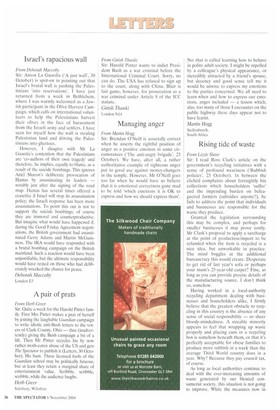Rising tide of waste
From Lizzie Slater Sir: I read Ross Clark's article on the government's recycling initiatives with a sense of profound weariness ('Rubbish policies', 23 October). In between the cliched complaints about fortnightly bin collections which householders 'suffer' and the impending burden on beleaguered farmers (subsidies anyone?), he fails to address the point that individuals and businesses are responsible for the waste they produce.
Granted the legislation surrounding this may be complex, and perhaps for smaller businesses it may prove costly. Mr Clark's proposal to apply a surcharge at the point of production/import to be refunded when the item is recycled is a nice idea, but unworkable in practice. The mind boggles at the additional bureaucracy this would create. Desperate to get rid of last year's sofa or perhaps your mum's 25-year-old carpet? Fine, as long as you can provide precise details of the manufacturing source. I don't think so, somehow.
Having worked in a local-authority recycling department dealing with businesses and householders alike, I firmly believe that the greatest obstacle to recycling in this country is the absence of any sense of social responsibility — or sheer bloody-mindedness. A sizeable minority appears to feel that wrapping up waste properly and placing cans in a recycling box is somehow beneath them, or that it's perfectly acceptable for obese families to produce more rubbish in a week than the average Third World country does in a year. Why? Because they pay council tax, of course.
As long as local authorities continue to deal with the ever-increasing amounts of waste generated by our bloated consumerist society, this situation is not going to improve. While the measures now in place may leave something to he desired. they're certainly a step in the right direction, and the sooner we get used to it, the better.
Lizzie Slitter
By email



























































































































 Previous page
Previous page